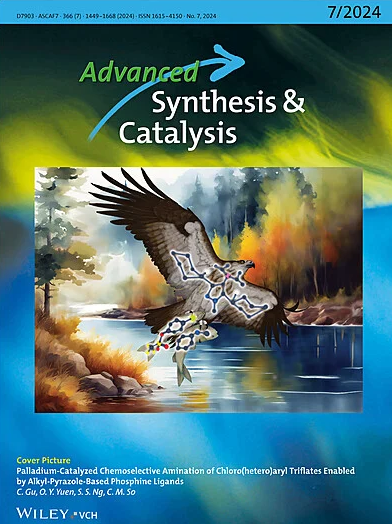用于自由基环化反应的铜与光催化协同策略
IF 4.4
2区 化学
Q2 CHEMISTRY, APPLIED
引用次数: 0
摘要
光协同过渡金属催化系统的快速发展为热过渡金属催化方法提供了一种绿色范例。然而,最常用的铱或钌络合物价格昂贵,而地壳中丰富的铜元素则因其独特的电子结构和光吸收特性而备受青睐。最近,铜与光催化协同策略在自由基环化反应中的应用取得了长足的进步,导致了功能性天然产物、药物及其类似物合成的复兴,但有关这方面的总结性工作尚未见报道。在本综述中,我们简要分析了配体选择对铜络合物和一些无机铜盐甚至光源的影响。然后,我们总结了自由基环化反应中的铜与光催化协同策略,并根据每种工作中自由基中心原子的类别,将其分为 C、N 和 O 自由基三类,在每一类中将依次从通过铜催化剂的配位环化、直接自由基环化和其他环化模式进行阐述。对于个别更复杂的反应,将对其机理进行探讨和简要讨论。本文章由计算机程序翻译,如有差异,请以英文原文为准。
Copper and Photocatalytic Synergistic Strategies for Radical Cyclization Reactions
The rapid development of photo-synergistic transition metal catalytic systems has provided a green paradigm to complement thermal transition metal catalytic methods. However, the most commonly used iridium or ruthenium complexes involve expensive in nature, in contrast to the abundant copper elements in the earth's crust, which are highly valued for their unique electronic structure and light-absorbing properties. Recently, the application of copper and photocatalytic synergistic strategies in radical cyclization reactions has progressed considerably, leading to a renaissance in the synthesis of functional natural products, drugs and their analogues, but summary work addressing this aspect has not been reported. In this review, we briefly analyze the effect of ligand choice on copper complexes and some inorganic copper salts and even on light sources. We then summarize the copper and photocatalytic synergistic strategies in radical cyclization reactions and classify them into three categories, C, N and O radicals, according to the class of the central atom of the radical in each work, and in each category will be elaborated in turn from coordination cyclization via Cu catalysts, direct radical cyclization and other cyclization mode. For individual more complex reactions, the mechanisms are explored and briefly discussed.
求助全文
通过发布文献求助,成功后即可免费获取论文全文。
去求助
来源期刊

Advanced Synthesis & Catalysis
化学-应用化学
CiteScore
9.40
自引率
7.40%
发文量
447
审稿时长
1.8 months
期刊介绍:
Advanced Synthesis & Catalysis (ASC) is the leading primary journal in organic, organometallic, and applied chemistry.
The high impact of ASC can be attributed to the unique focus of the journal, which publishes exciting new results from academic and industrial labs on efficient, practical, and environmentally friendly organic synthesis. While homogeneous, heterogeneous, organic, and enzyme catalysis are key technologies to achieve green synthesis, significant contributions to the same goal by synthesis design, reaction techniques, flow chemistry, and continuous processing, multiphase catalysis, green solvents, catalyst immobilization, and recycling, separation science, and process development are also featured in ASC. The Aims and Scope can be found in the Notice to Authors or on the first page of the table of contents in every issue.
 求助内容:
求助内容: 应助结果提醒方式:
应助结果提醒方式:


